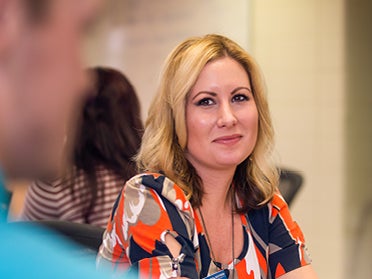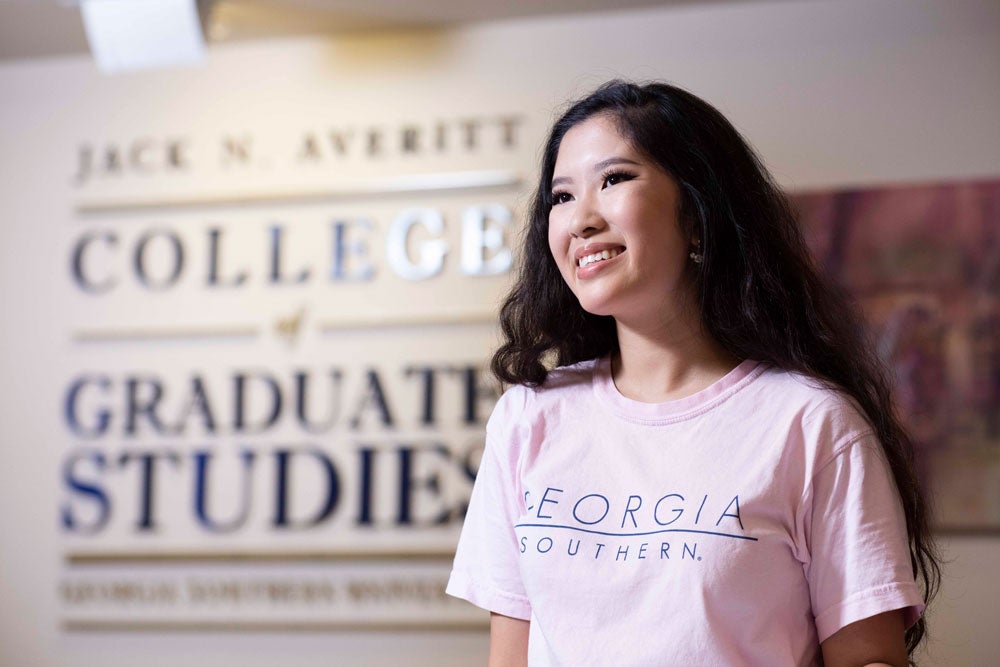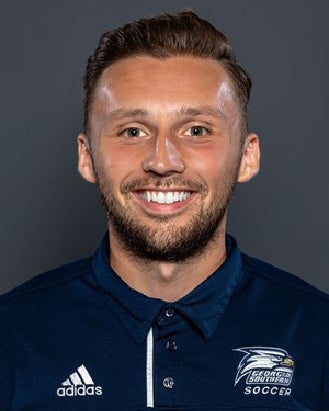Empower others to thrive, offering a listening ear and skilled guidance to restore well-being as a school or mental health counselor.
Locations
- Statesboro Campus (In Person)
Why Earn a Master’s Degree in Counselor Education?
- Prepare for state licensure.
- Programs nationally accredited by CACREP since 2009.
- Outstanding graduate placement rate.
- Emphasis on social justice.
- 60 credit hours to completion.
Access comprehensive training to become an effective, culturally responsive professional counselor through Georgia Southern University’s CACREP-accredited Master of Education (MEd) in Counselor Education program, and prepare to meaningfully impact others’ lives — whether in K-12 schools or your community.
Choose from specializations in clinical mental health counseling or school counseling, both of which satisfy requirements for state licensure. Experienced faculty active in research and committed to your learning teach practically focused courses on our Statesboro campus. Complementing your classroom knowledge, you’ll hone your clinical skills during extensive practicum and internship experiences, ensuring you graduate ready for the challenges of professional practice.
Additionally, student professional organizations give you the opportunity to build your network and expand your perspective of the field.
Ready to Apply?
What Can You Do With a Master’s in Counselor Education?
Use your skills and holistic understanding of counseling principles to support the growth and mental health of others. Depending on your concentration, you’ll be ready for licensure and service in either school or community-based settings.
What You’ll Learn
For both concentrations, your studies begin with core learning in human development, theories of counseling, counseling techniques and strategies, assessment methods and the dynamics of counseling in particular settings.
From there, you will deepen your understanding in areas aligned with your career direction, exploring topics like leadership and intervention in schools or addictions counseling.
Translating theories into the real world, you will complete both a 100-hour practicum, including 40 hours of direct work with clients, and a 600-hour clinical internship. Through both assignments, experienced professionals provide support and give you feedback to help you refine your practice.
See the CurriculumConcentrations
Where do you feel drawn to serve? The master’s in counselor education program has two concentrations designed to match different career aspirations.
School Counseling
Focus your counselor training on the school setting, preparing to support students both directly and through fostering an environment where they can thrive. The concentration meets all requirements for school counseling certification in Georgia.
Clinical Mental Health Counseling
Prepare to serve the broader community as a clinical mental health counselor in private, public or nonprofit settings. For those intending to become a National Certified Counselor (NCC) or a Licensed Professional Counselor (LPC), the program meets all academic requirements for licensure.
Build Your Experience
Prepare for licensure and effective practice through extensive hands-on experience. Grow as a professional and develop your network by engaging in student-led professional organizations.

Clinical Internship
You’ll have ample opportunity to develop your clinical skills with clients in settings that align with your career goals. Through close mentorship and constructive feedback, you’ll gain experience applying theory to real-world situations as you gain confidence in your abilities.

Professional Organizations
Strengthen your preparation and connect more broadly to colleagues and the field of counseling through active professional organizations on campus, including Chi Sigma Iota and Licensed Professional Counselors of Georgia.
Want to Learn More?
Explore essential information about our MEd in Counselor Education program, including application details, accreditation status, and licensing disclosures. Gain insight into the program’s credibility and requirements to help you start your journey toward success with the knowledge you need.
The MEd in Counselor Education program is open to those with a bachelor’s degree from a regionally accredited institution with a cumulative GPA of at least 2.50 (on a 4.0 scale) for all previous undergraduate and graduate coursework.
To apply, please submit:
- An online application. (There is a $50 non-refundable application fee.)
- A statement of purpose, no more than 1,000 words, indicating your reasons for pursuing graduate study and how admission to this program relates to your professional goals.
- A current résumé.
- Two letters of recommendation. Have letter writers send them directly to gasc@georgiasouthern.edu.
- All “Disclosure and Affirmation” statements, which address the Code of Ethics for Educators and the need for tort liability insurance. These acknowledgments are represented by a section in the online application that you will initial.
- Transcripts for all prior college-level work. Copies can be uploaded with your application; official copies sent directly to the College of Education will be required for admitted students.
Submit your personal statement and résumé to gasc@georgiasouthern.edu.
Application Deadlines
Students are admitted to begin in both the fall and summer terms. The application deadline for both is Feb. 1.
Your application and all required documents must be received by the deadline.
Admission Requirements
Note: Admission to the graduate program is required. Non-degree status to achieve initial certification is not permitted.
Regular Admission
- Complete requirements for a bachelor’s degree from a college or university accredited by an appropriate institutional accreditor.
- Present a cumulative 2.50 (4.0 scale) grade point average or higher onall undergraduate and graduate work combined.
- Submit a personal statement of purpose, not to exceed 1000 words, that identifies the applicant’s reasons for pursuing graduate study and how admission into the program relates to the applicant’s professional goals and aspirations.
- Submit a current resume.
- Submit two letters of recommendation.
- Submit a completed “Disclosure and Affirmation Form” that addresses misconduct disclosure, criminal background check, the Code of Ethicsfor Educators, and tort liability insurance.
- Participate in an on-campus interview.
Provisional Admission
Consideration for provisional admission available for Concentration Two, Clinical Mental Health Counseling, only. Applicants may be approved for provisional admission based on the quality of the admission material presented. Provisional students must earn grades of B or higher in their first nine (9) credits of course work after admission and meet any other stipulations outlined by the department to be converted to regular status.
The Counselor Education Program at Georgia Southern University is a full-time residential program offered on the Statesboro campus with two concentrations: School Counseling and Clinical Mental Health Counseling. The program is accredited by the Council for Accreditation of Counseling and Related Educational Programs (CACREP). CACREP Program Outcomes Report (PDF).
The College of Education anticipates that graduates of the Counselor Education Certification program will seek state licenses or certifications.
The program listed above leads to a Georgia Certificate Upgrade. Visit the Georgia Professional Standards Commission for more information. The College of Education has not determined where its programs will qualify a graduate to take the required exams in other states or territories. Check the requirements of your state or territory using the link provided.
The Counselor Education Program prepares students to practice as professional counselors and to become leaders and advocates committed to professional and personal growth, ethical practice and social justice in clinical mental health, higher education and school settings. Graduates are reflective, dedicated professionals committed to meeting the needs of a diverse population and pluralistic society. The Counselor Education Program is committed to the preparation and continual development of counselors-in-training and professional counselors.
Counselor Education Program Objectives
- Understand professional counseling practice, including ethics, advocacy, technology, credentialing, and history.
- Understand human growth and development across the lifespan.
- Understand the counseling and advocacy implications of living and working in a multicultural and diverse society.
- Understand the philosophy of counseling, as well as contemporary counseling theories and practices.
- Understand counseling, referral, and consultation processes.
- Understand group development and dynamics.
- Understand career development and career counseling.
- Understand counseling approaches to assessment and evaluation in a diverse society.
- Understand the implications of research for counseling practice.

Take the Next Step
Gain the preparation you need to support and spark positive change in others. Start your journey toward professional counselor licensure at Georgia Southern.
Program Inquiries:
Graduate Academic Services Center
gasc@georgiasouthern.edu
(912) 478-1447


